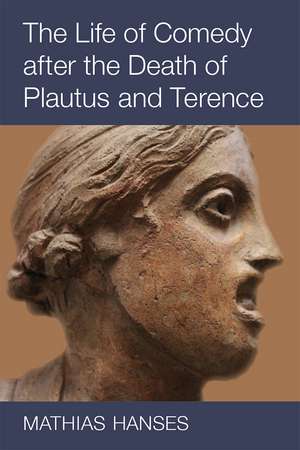The Life of Comedy after the Death of Plautus and Terence
Autor Mathias Hansesen Limba Engleză Hardback – 10 dec 2020
The Life of Comedy after the Death of Plautus and Terence documents the ongoing popularity of Roman comedies, and shows that they continued to be performed in the late Republic and early Imperial periods of Rome. Playwrights Plautus and Terence impressed audiences with stock characters as the young-man-in-love, the trickster slave, the greedy pimp, the prostitute, and many others. A wide range of spectators visited Roman theaters, including even the most privileged members of Roman society: orators like Cicero, satirists like Horace and Juvenal, and love poets like Catullus and Ovid. They all put comedy’s varied characters to new and creative uses in their own works, as they tried to make sense of their own lives and those of the people around them by suggesting comparisons to the standard personality types of Roman comedy.
Scholars have commonly believed that the plays fell out of favor with theatrical audiences by the end of the first century BCE, but The Life of Comedy demonstrates that performances of these comedies continued at least until the turn of the second century CE. Mathias Hanses traces the plays’ reception in Latin literature from the late first century BCE to the early second century CE, and shines a bright light on the relationships between comic texts and the works of contemporary and later Latin writers.
Scholars have commonly believed that the plays fell out of favor with theatrical audiences by the end of the first century BCE, but The Life of Comedy demonstrates that performances of these comedies continued at least until the turn of the second century CE. Mathias Hanses traces the plays’ reception in Latin literature from the late first century BCE to the early second century CE, and shines a bright light on the relationships between comic texts and the works of contemporary and later Latin writers.
Preț: 536.38 lei
Preț vechi: 631.04 lei
-15% Nou
Puncte Express: 805
Preț estimativ în valută:
102.68€ • 105.60$ • 85.19£
102.68€ • 105.60$ • 85.19£
Carte indisponibilă temporar
Doresc să fiu notificat când acest titlu va fi disponibil:
Se trimite...
Preluare comenzi: 021 569.72.76
Specificații
ISBN-13: 9780472132256
ISBN-10: 0472132253
Pagini: 426
Ilustrații: 8 illustrations
Dimensiuni: 152 x 229 x 38 mm
Greutate: 0.65 kg
Editura: UNIVERSITY OF MICHIGAN PRESS
Colecția University of Michigan Press
ISBN-10: 0472132253
Pagini: 426
Ilustrații: 8 illustrations
Dimensiuni: 152 x 229 x 38 mm
Greutate: 0.65 kg
Editura: UNIVERSITY OF MICHIGAN PRESS
Colecția University of Michigan Press
Notă biografică
Mathias Hanses is Assistant Professor of Classics and Ancient Mediterranean Studies, Penn State University.
Recenzii
“An extremely ambitious undertaking on multiple fronts, the book promises to cast new light not only on the entire genre of Roman comedy itself but also on how virtually the entire corpus of late republican and early imperial Latin literature engaged with comic writing as a modello codice. It brilliantly accomplishes its goal.”
—Judith Hallett, University of Maryland
"In this elegant contribution to theater history, Hanses (Penn State) traces the reception of Roman comedy in Latin literature down to the early Roman Empire. ...Hanses makes his case with a refined literary sensibility and impressive scholarship, and he sheds new light on numerous passages in the texts discussed. Highly recommended."
"Taken as a whole, the book’s strengths are many. It combines literary analysis with excellent acknowledgment of performance styles and contexts. In other words, H. treats these works as plays, not just texts, which is greatly to his credit. It also offers fresh perspectives on established topics such as comoedia palliata’s influence on Roman love elegy."
"Hanses amply demonstrates the value of considering performance when studying allusions to and intertexts with Roman comedy of the late Republic and early Empire. Indeed, his observation that comedy was performed alongside tragedy and mime leads to an assessment of Latin literary genres which takes into account not only the role of comedy, but also the relationships between performance and genre."
—Judith Hallett, University of Maryland
"In this elegant contribution to theater history, Hanses (Penn State) traces the reception of Roman comedy in Latin literature down to the early Roman Empire. ...Hanses makes his case with a refined literary sensibility and impressive scholarship, and he sheds new light on numerous passages in the texts discussed. Highly recommended."
"Taken as a whole, the book’s strengths are many. It combines literary analysis with excellent acknowledgment of performance styles and contexts. In other words, H. treats these works as plays, not just texts, which is greatly to his credit. It also offers fresh perspectives on established topics such as comoedia palliata’s influence on Roman love elegy."
"Ancient reception also occupies Mathias Hanses in his study of the ‘life’ of comedy after Plautus and Terence. Originating in a Yale PhD, it begins by charting a literary- social history of comedy at Rome..."
"Hanses amply demonstrates the value of considering performance when studying allusions to and intertexts with Roman comedy of the late Republic and early Empire. Indeed, his observation that comedy was performed alongside tragedy and mime leads to an assessment of Latin literary genres which takes into account not only the role of comedy, but also the relationships between performance and genre."
Descriere
A novel study of the popularity of Roman comedies well into the second century CE
